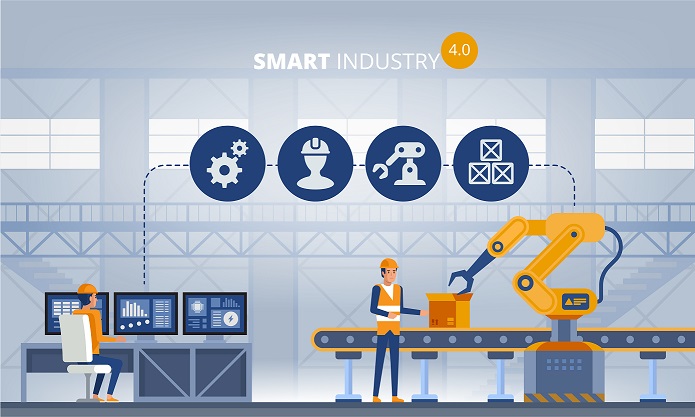Cybercrimes worldwide cost $12.5 billion in 2023, according to reports. From 2022, this amount surged by about $2 billion. These figures are not going down; in fact, many businesses will continue to see increases in cyberattacks and related financial losses in absent action, especially when it comes to smart manufacturing factories. Shifting a bit of focus to the manufacturing sector, IBM security has established that the manufacturing industry is the worst hit by cyber-attacks, with about 25% of global cyber-attacks targeting the manufacturing industry.
Gradually, smart manufacturing has become very important. Although they are still under development, NIST manufacturing cybersecurity policies and standards exist to adopt and guarantee smart manufacturing cybersecurity. Before we dive into the importance of cyber security in the manufacturing industry and actions businesses can take to protect themselves from cyber attacks, what exactly is smart manufacturing, and how does cybersecurity play a role in this innovative approach?

What is Smart Manufacturing in Cybersecurity?
Manufacturing is an age-old sector, and consequently, many of the technologies used in the industry are quite old, albeit efficient at their inception. There are more advanced ways to carry out manufacturing processes. Smart Manufacturing involves using modern industrial technology and the Internet to monitor and execute industrial processes. The goal is to spot opportunities for process automation while using data to improve manufacturing efficiency. In this process, there is more interconnection between IT and OT and interactions between new technologies and legacy manufacturing systems.
Cybersecurity includes every effort to protect devices and processes connected to and reliant on the Internet from threats and attacks against their systems. Now that we have examined what smart manufacturing is and what cybersecurity entails, we can easily define what smart manufacturing cybersecurity is.
Smart manufacturing cybersecurity refers to the protection of systems and technology, both new and old, that are vital in the manufacturing process. It includes securing IIoT, AI in manufacturing, OT security, and more.
Why is Cyber Security Important in The Manufacturing Industry?
One cannot stress the relevance of cybersecurity for the manufacturing sector. Many sectors depend on the manufacturing sector as it is related to so many other operations; attacks on the sector have knock-on consequences that could harm individuals and companies. Here are five reasons why businesses across the globe should prioritize industrial cybersecurity.
- The rise of smart manufacturingWith the advent of Industry 4.0, technology has been included in the manufacturing process, which has developed into the smart manufacturing phenomenon. This investment in smart technologies like AI, IoT, AR, automation, and more has caused a corresponding increase in efficiency and cost savings. Still, it also brings certain drawbacks with its advantages. One major drawback of including a lot of technology in the manufacturing industry is the increase in the surface of attacks by hackers. This is one crucial reason why smart manufacturing cybersecurity should be included in every manufacturing security plan.
- Outdated security practices
A key reason cybersecurity is important for many companies in the manufacturing sector is not that they do not employ security measures but that these security measures are primarily outdated and do not align with emerging technologies. Adopting lean practices and over-reliance on dated security practices leaves their systems vulnerable to attacks. Implementing smart manufacturing cybersecurity measures and ICS Best Practices can help beef up security and implement more modern approaches to general cybersecurity safety. - IP safety
A company’s intellectual property enables it to stand out in the market, and safeguarding such vital information should be a priority for manufacturers. Many recent attacks from hackers have been directed at the intellectual properties and proprietary technologies of many manufacturing companies. It would take investments in smart manufacturing cybersecurity measures to reduce the frequency of such attacks and secure the IPs of manufacturers. - Financial loss
Heavy financial strain is a major reason cybersecurity is important in manufacturing. Losses that can come from a breach or damage to critical OT and IT systems and payment of ransoms on stolen data negatively impact companies’ bottom line. Hackers can disrupt supply chains, cause legal issues for manufacturing companies, and increase financial loss over time. - Data Protection
Manufacturing companies’ data is frequently targeted by hackers and malicious entities due to the presence of sensitive information, including proprietary designs, patents, client data, and operational data. Cyber attacks can compromise this data and adversely affect the reputation of the affected manufacturer.Competitors can develop proprietary technology without research if proprietary designs are hacked and stolen, creating competition and removing a manufacturer’s unique edge. Stolen customer and client data can fracture business relationships and risk financial losses.
Why Do Smart Factories Need to Prioritize Cybersecurity?
Smart manufacturing cybersecurity is a must for any manufacturer developing or migrating to a smart factory setup, and this has become very common as IT and OT integrate more. But why should smart factories prioritize cybersecurity?
Compliance with regulations
Laws are evolving to accommodate changes in critical industries, and the manufacturing industry is no exception. These laws mainly aim to combat the rise of cyber threats and attacks in the manufacturing sector. Factories and other manufacturing companies must implement smart manufacturing cybersecurity measures to comply with regulations and laws. Non-compliance with these regulations could result in fines, legal action, and even the shutdown of the manufacturer.
Securing remote access and automation.
A cool new feature of Industry 4.0 is increased automation, remote access, and monitoring. This is because these improvements to industry technology increase efficiency and productivity but also provide new loopholes for Cyber attacks. Improving cybersecurity measures through encryption and multi-factor authentication increases general cyber security, particularly smart manufacturing cybersecurity.
Reducing operational disruption
There are a lot of processes involved in production in manufacturing companies. A disruption at any stage can negatively impact output and disrupt supply lines. Many of these processes have involved more smart manufacturing processes, making them easier targets for ransomware attacks and other cybersecurity threats. A good example was the attack on Schreiber Foods in 2021, which disrupted milk supply in Wisconsin. There have been other similar attacks, especially in the food industry, and this has prompted an increased focus on food and beverage cybersecurity globally, and rightfully so.
How to Protect Smart Manufacturing Lines From Cyber Threats?
It is apparent that with the advantages of smart manufacturing, there are cybersecurity risks and a need to have protective smart manufacturing cybersecurity measures in place.
To protect smart manufacturing lines from cyber threats, here are five measures to take:
Conduct risk assessment at intervals
It is difficult to identify security risks without conducting risk assessments. Conducting risk assessment procedures at intervals helps identify possible loopholes and prevent them from becoming cybersecurity risks. Companies should endeavor to activate automatic risk assessment protocols to ensure that cybersecurity is continuously monitored.
Install and maintain system access control and encryption measures
When accessing data, companies must employ tight security protocols to protect smart manufacturing systems. Industry-standard encryption techniques should protect real-time data integrity. Technologies such as digital signatures and cryptographic hash algorithms can permit system access by specified employees. Each facility should use multiple encryption mechanisms to deter internal or external system attackers.
Observe suggested technological regulations
Existing and developing laws guide and protect the introduction of smart technologies into manufacturing. Ensuring that those regulations and laws are complied with is a step in the right direction in securing smart manufacturing cybersecurity, such as NIS2 and more
Train staff on smart manufacturing cybersecurity measures
Your staff are vital for cybersecurity safety; they can be the weakest link and the strongest protection when safeguarding smart manufacturing systems and reacting promptly to cybersecurity threats. Proper training on smart cybersecurity safety protocols and practices can safeguard smart manufacturing systems and reduce cyber threat risks.
Create a plan for handling incidents
Improving smart manufacturing cybersecurity is great and can essentially eliminate the risks of attacks, but every good manufacturing company should be prepared for situations where breaches occur. Intentionally preparing and equipping your staff to handle the aftermath of cyber attacks can reduce the financial loss margin and help prevent extensive damage to IT and OT systems.
OTORIO Titan and Smart Manufacturing Cybersecurity
OTORIO Titan is an advanced cybersecurity solution that plays a crucial role in protecting smart manufacturing environments. With the rise of interconnected OT and IT systems in Industry 4.0, manufacturing processes are increasingly vulnerable to cyberattacks. OTORIO Titan provides manufacturers with comprehensive visibility into their assets and security posture, enabling real-time threat detection and mitigation across OT, IoT, and IT networks. By leveraging analytics and automated risk assessment, Titan ensures that outdated security practices are replaced with proactive, modern defense strategies. This helps manufacturers prevent costly disruptions, and ensure compliance with evolving cybersecurity regulations, ultimately saving billions in potential losses.
Ensure safe, resilient, and compliant business operations
Follow Us
HQ
ISRAEL
Hamasger St 39, Tel Aviv
USA
260 Ainslie St, Brooklyn
Book a Demo


OTORIO empowers operational & security teams to proactively manage digital risks and build resilient operations via a technology-enabled ecosystem.
Platform


